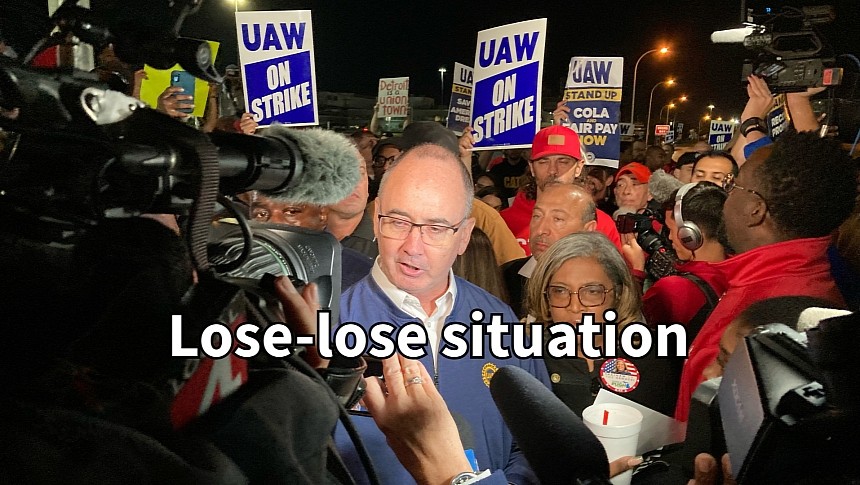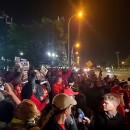The UAW strike threatens to upend the car market, with far-reaching implications throughout American society. Everyone is a loser, starting with carmakers, parts manufacturers, and car buyers. Still, the strike will likely have the worst effect on workers who started it.
The UAW strike was long in the making, ever since the union elected Shawn Fain as President on March 26. Fain spoke about "corporate greed" and claimed that automotive workers make poverty-level wages. Under his leadership, the UAW pressured automakers to offer a 46% pay increase across a four-year contract (although it lowered the demand to 36%), pension benefits for all employees, more paid time off (including a four-day workweek), and more job protections.
The Detroit Three could not or did not want to bow to the UAW demands, so the strike began at three factories that built some of the automakers' most popular models, like Chevrolet Colorado, Jeep Wrangler, and Ford Bronco. It was the first time in UAW's 88-year history that it struck against all three Detroit carmakers simultaneously. Ford, GM, and Stellantis responded by laying off almost 3,000 workers, blaming the knock-on effects caused by the strikes.
The UAW raised the stakes by expanding the walkouts at GM and Stellantis but refrained from putting more pressure on Ford. Although it's premature, it appears that Ford has been more open regarding UAW's requests. Negotiations are still in progress, but no matter how they end, carmakers are between a rock and a hard place.
All three American carmakers are losing money while switching to electrification, although their ICE business still returns healthy profits. The window of opportunity is closing fast, though, as ICE vehicle sales are shrinking, and their electric vehicles are far from being competitive in a market dominated by Tesla.
If the legacy carmakers refuse to negotiate, they risk losing a staggering amount of money in the short term. According to early estimates, the first week of strikes caused Detroit Three more than $1.6 billion in losses. The losses will only accelerate as the strike threatens to halt production at an additional 38 GM and Stellantis parts and distribution centers.
This is terrible news for the employees of these plants. They are not part of UAW and are not protected by the strike fund. They also don't get to choose whether to work or not. They are collateral victims of the UAW strike. As the losses mount, these workers are sent home with no pay. To make matters worse, leaked messages from last week suggest the UAW might be bargaining in bad faith.
The messages show a close aide to UAW President Shawn Fain saying that negotiations with carmakers aren't made to yield progress toward a new deal. Instead, the purpose is to inflict "recurring reputation damage and operational chaos" on all three automakers.
Higher car prices will cause inflation to reignite, rendering all the efforts in the past year useless. This means more interest rate hikes and more pain for everyone. Inevitably, this will cause the domestic new car sales to grind to a halt. Dealers will feel the pressure and flock to the used car market in search of cheaper inventory. Expect the used car prices to go through the roof, the same as last year. The main difference is that today's economic conditions are far worse, and buyers cannot absorb more price hikes.
Remarkably, the most affected will be the unionized workers who started this chain of events in the first place. Car sales decline is almost sure to cause layoffs into 2024. In the wake of unrealistic UAW demands, some people say that Shawn Fain is either a genius (if he can get Detroit Three to accept the demands) or a fool. One year from now, it's more likely to prove the latter.
The real winner is Tesla, which already had a cost advantage over Ford, GM, and Stellantis. With its non-unionized workforce, Tesla is best positioned to benefit long-term no matter how the strike ends. If the UAW wins its benefits, this will crash Detroit Three's margins, making it more challenging to sustain massive investments in electric vehicles, battery cells, and new car factories. If it loses, this will deal a heavy blow to unions, which will only strengthen Tesla's position.
The Detroit Three could not or did not want to bow to the UAW demands, so the strike began at three factories that built some of the automakers' most popular models, like Chevrolet Colorado, Jeep Wrangler, and Ford Bronco. It was the first time in UAW's 88-year history that it struck against all three Detroit carmakers simultaneously. Ford, GM, and Stellantis responded by laying off almost 3,000 workers, blaming the knock-on effects caused by the strikes.
The UAW raised the stakes by expanding the walkouts at GM and Stellantis but refrained from putting more pressure on Ford. Although it's premature, it appears that Ford has been more open regarding UAW's requests. Negotiations are still in progress, but no matter how they end, carmakers are between a rock and a hard place.
Carmakers face a lose-lose situation
Although union leaders claim that carmakers could double the wages and still make a ton of money, car companies say they face existential threats. Their margins will shrink significantly if they concede to UAW demands and raise wages. This will make competing against Tesla's lean manufacturing in the long term impossible. The situation will only deteriorate as Tesla improves manufacturing and cuts costs further.All three American carmakers are losing money while switching to electrification, although their ICE business still returns healthy profits. The window of opportunity is closing fast, though, as ICE vehicle sales are shrinking, and their electric vehicles are far from being competitive in a market dominated by Tesla.
If the legacy carmakers refuse to negotiate, they risk losing a staggering amount of money in the short term. According to early estimates, the first week of strikes caused Detroit Three more than $1.6 billion in losses. The losses will only accelerate as the strike threatens to halt production at an additional 38 GM and Stellantis parts and distribution centers.
Suppliers are also under fire as plants fall like domino tiles
The auto industry is highly integrated, and a plant closure will cause mayhem throughout the supply chain. Closing one plant will cause shutdowns and layoffs at other plants. At this stage, suppliers working with GM and Stellantis face insurmountable challenges. Many have small-margin contracts with a handful of plants, and one of them closing is a big deal.This is terrible news for the employees of these plants. They are not part of UAW and are not protected by the strike fund. They also don't get to choose whether to work or not. They are collateral victims of the UAW strike. As the losses mount, these workers are sent home with no pay. To make matters worse, leaked messages from last week suggest the UAW might be bargaining in bad faith.
The messages show a close aide to UAW President Shawn Fain saying that negotiations with carmakers aren't made to yield progress toward a new deal. Instead, the purpose is to inflict "recurring reputation damage and operational chaos" on all three automakers.
The biggest losers are regular people like you and me
If you think the strike only affects the carmakers, you've learned nothing from the past two years. The strike will cause the inventory of many popular car models to deplete. This inevitably leads to price increases and shoddy dealer practices. The same happens if unions have it their way, causing car manufacturing costs to rise. We've seen it already when the economy warmed up after the pandemic subsided.Higher car prices will cause inflation to reignite, rendering all the efforts in the past year useless. This means more interest rate hikes and more pain for everyone. Inevitably, this will cause the domestic new car sales to grind to a halt. Dealers will feel the pressure and flock to the used car market in search of cheaper inventory. Expect the used car prices to go through the roof, the same as last year. The main difference is that today's economic conditions are far worse, and buyers cannot absorb more price hikes.
Remarkably, the most affected will be the unionized workers who started this chain of events in the first place. Car sales decline is almost sure to cause layoffs into 2024. In the wake of unrealistic UAW demands, some people say that Shawn Fain is either a genius (if he can get Detroit Three to accept the demands) or a fool. One year from now, it's more likely to prove the latter.
Who's the winner of this union movement?
Before you conclude that there are no real winners from the UAW strike, I must say that this is not true. Some laugh all the way to the bank right now. All other car manufacturers unaffected by the UAW strike and their dealers will see a boost as Detroit Three production falters. For their part, the longer the strike lasts, the more money they can make. But that's just for the medium term.The real winner is Tesla, which already had a cost advantage over Ford, GM, and Stellantis. With its non-unionized workforce, Tesla is best positioned to benefit long-term no matter how the strike ends. If the UAW wins its benefits, this will crash Detroit Three's margins, making it more challenging to sustain massive investments in electric vehicles, battery cells, and new car factories. If it loses, this will deal a heavy blow to unions, which will only strengthen Tesla's position.







